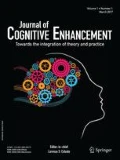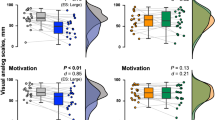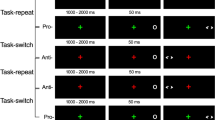Abstract
The benefits of physical exercise on brain function and its metabolism are well documented, and it is established that acute aerobic exercise could enhance executive function. The aim of this study was to report the effect of exercise intensity during acute intermittent exercise (IE) on executive function and heart rate outcomes. Twenty male subjects performed a series of six consecutive 3-min bouts of exercise at either 60 or 95% of peak power output (PPO), interspersed by 3 min of passive recovery on a bicycle ergometer. Reaction time (ms) and accuracy (%) of switching task using a computerized Stroop task were recorded before and after warm-up, after each bout of exercise and every 15 min during a 1-h passive recovery following exercise. A two-way repeated measures ANOVA was performed to quantify the effects of exercise time (bouts) and condition (exercise intensity). The ANOVA revealed a main effect of time and an interaction between intensity and time for the heart rate and heart rate variability, RPE, and perceived difficulty of cognitive tasks (p < 0.05). The session at 95% PPO induced a more important subjective and objective fatigue than at 60%. Also, participants found the switching task more difficult after the third repetition at 95% and throughout the repetition of the task during IE. Compared to baseline, cognitive performance was improved at both intensities (main effect of time; p < 0.05). However, IE at 60% induced lower reaction time (ES = − 1.1) than at 95% (ES = − 0.7). The decrease in reaction time persisted during the recovery period, following IE at 60% but returned to baseline 30 min after the IE at 95%. Our results demonstrate that both moderate and high exercise intensity enhance cognitive performance during and following IE. The greater perceived exertion and lower parasympathetic activity during exercise at 95% PPO could be responsible for the smaller improvement on reaction time, when compared to exercise at 60% PPO.






Similar content being viewed by others
References
Arnsten, A. F. (2009). Stress signalling pathways that impair prefrontal cortex structure and function. Nature Reviews. Neuroscience, 10(6), 410–422. https://doi.org/10.1038/nrn2648.
Arnsten, & Goldman-Rakic. (1985). Alpha 2-adrenergic mechanisms in prefrontal cortex associated with cognitive decline in aged nonhuman primates. Science, 230(4731), 1273–1276.
Basso Moro, S., Cutini, S., Ursini, M. L., Ferrari, M., & Quaresima, V. (2013). Prefrontal cortex activation during story encoding/retrieval: a multi-channel functional near-infrared spectroscopy study. Frontiers in Human Neuroscience, 7, 925. https://doi.org/10.3389/fnhum.2013.00925 eCollection 02013.
Billaut, F., Basset, F. A., Giacomoni, M., Lemaitre, F., Tricot, V., & Falgairette, G. (2006). Effect of high-intensity intermittent cycling sprints on neuromuscular activity. International Journal of Sports Medicine, 27(1), 25–30. https://doi.org/10.1055/s-2005-837488.
Borg G. (1982). Psychological bases of perceived exertion. Med Sci Sports Exerc, 14, 377–387
Brisswalter, J., Collardeau, M., & Rene, A. (2002). Effects of acute physical exercise characteristics on cognitive performance. Sports Medicine, 32(9), 555–566.
Camm, A. J., Malik, M., Bigger, J. T., Breithardt, G., Cerutti, S., Cohen, R. J., et al. (1996). Heart rate variability—standards of measurement, physiological interpretation, and clinical use. Circulation, 93(5), 1043–1065.
Chang, Y. K., & Etnier, J. L. (2009). Exploring the dose-response relationship between resistance exercise intensity and cognitive function. Journal of Sport & Exercise Psychology, 31(5), 640–656.
Chang, Y. K., Labban, J. D., Gapin, J. I., & Etnier, J. L. (2012). The effects of acute exercise on cognitive performance: a meta-analysis. Brain Research, 1453, 87–101. https://doi.org/10.1016/j.brainres.2012.1002.1068.
Cohen J. (1988). Statistical power analysis for the behavioral sciences. 2nd ed. Hillsdale: L. Erlbaum Associates.
Cooper, C. J. (1973). Anatomical and physiological mechanisms of arousal with specific reference to the effects of exercise. Ergonomics, 16, 601–609.
Davey, C. P. (1973). Physical exertion and mental performance. Ergonomics, 16(5), 595–599. https://doi.org/10.1080/00140137308924550.
Davranche, K., & Audiffren, M. (2004). Facilitating effects of exercise on information processing. Journal of Sports Sciences, 22(5), 419–428. https://doi.org/10.1080/02640410410001675289.
Delignières, D. (1993). La perception de l’effort et de la difficulté. In J. P. Famose (Ed.), Cognition Et Performance (pp. 183–218). Paris: INSEP Publications.
Delignires, D., Famose, J., & Genty, J. (1994). Validation d'une chelle de catgeories pour la perception de la difficulté. Revue STAPS, 33, 77–88.
Dietrich, A. (2003). Functional neuroanatomy of altered states of consciousness: the transient hypofrontality hypothesis. Consciousness and Cognition, 12(2), 231–256. https://doi.org/10.1016/s1053-8100(02)00046-6.
Dietrich, A., & Sparling, P. B. (2004). Endurance exercise selectively impairs prefrontal-dependent cognition. Brain and Cognition, 55(3), 516–524. https://doi.org/10.1016/j.bandc.2004.03.002.
Dupuy, O., Renaud, M., Bherer, L., & Bosquet, L. (2010). Effect of functional overreaching on executive functions. International Journal of Sports Medicine. https://doi.org/10.1055/s-0030-1255029.
Dupuy, O., Mekary, S., Berryman, N., Bherer, L., Audiffren, M., & Bosquet, L. (2012). Reliability of heart rate measures used to assess post-exercise parasympathetic reactivation. Clinical Physiology and Functional Imaging, 32(4), 296–304. https://doi.org/10.1111/j.1475-1097X.2012.01125.x.
Dupuy, O., Lussier, M., Fraser, S., Bherer, L., Audiffren, M., & Bosquet, L. (2014). Effect of overreaching on cognitive performance and related cardiac autonomic control. Scandinavian Journal of Medicine & Science in Sports, 24(1), 234–242. https://doi.org/10.1111/j.1600-0838.2012.01465.x.
Dupuy, O., Gauthier, C. J., Fraser, S. A., Desjardins-Crepeau, L., Desjardins, M., Mekary, S., et al. (2015). Higher levels of cardiovascular fitness are associated with better executive function and prefrontal oxygenation in younger and older women. Frontiers in Human Neuroscience, 9, 66. https://doi.org/10.3389/fnhum.2015.00066 eCollection 02015.
Gibala, M. J. (2007). High-intensity interval training: a time-efficient strategy for health promotion? Current Sports Medicine Reports, 6(4), 211–213.
Guiraud, T., Nigam, A., Gremeaux, V., Meyer, P., Juneau, M., & Bosquet, L. (2012). High-intensity interval training in cardiac rehabilitation. Sports Medicine, 42(7), 587–605. https://doi.org/10.2165/11631910-000000000-000000000.
Hansen, A. L., Johnsen, B. H., & Thayer, J. E. (2003). Vagal influence on working memory and attention. International Journal of Psychophysiology, 48(3), 263–274. https://doi.org/10.1016/s0167-8760(03)00073-4.
Hill, E. E., Zack, E., Battaglini, C., Viru, M., Viru, A., & Hackney, A. C. (2008). Exercise and circulating cortisol levels: the intensity threshold effect. Journal of Endocrinological Investigation, 31(7), 587–591. https://doi.org/10.1007/BF03345606.
Huszczuk, A., Whipp, B. J., & Wasserman, K. (1990). A respiratory gas exchange simulator for routine calibration in metabolic studies. Eur Respir J, 3, 465–468.
Johnsen, B. H., Thayer, J. F., Laberg, J. C., Wormnes, B., Raadal, M., Skaret, E., et al. (2003). Attentional and physiological characteristics of patients with dental anxiety. Journal of Anxiety Disorders, 17(1), 75–87. https://doi.org/10.1016/s0887-6185(02)00178-0.
Joyce, J., Graydon, J., McMorris, T., & Davranche, K. (2009). The time course effect of moderate intensity exercise on response execution and response inhibition. Brain and Cognition, 71(1), 14–19. https://doi.org/10.1016/j.bandc.2009.1003.1004.
Kaikkonen, P., Hynynen, E., Mann, T., Rusko, H., & Nummela, A. (2010). Can HRV be used to evaluate training load in constant load exercises? European Journal of Applied Physiology, 108(3), 435–442. https://doi.org/10.1007/s00421-00009-01240-00421.
Kimhy, D., Crowley, O. V., McKinley, P. S., Burg, M. M., Lachman, M. E., Tun, P. A., et al. (2013). The association of cardiac vagal control and executive functioning—findings from the MIDUS study. Journal of Psychiatric Research, 47(5), 628–635. https://doi.org/10.1016/j.jpsychires.2013.01.018.
Kujach, S., Byun, K., Hyodo, K., Suwabe, K., Fukuie, T., Laskowski, R., et al. (2017). A transferable high-intensity intermittent exercise improves executive performance in association with dorsolateral prefrontal activation in young adults. NeuroImage, 169, 117–125. https://doi.org/10.1016/j.neuroimage.2017.1012.1003.
Labelle, V., Bosquet, L., Mekary, S., & Bherer, L. (2013). Decline in executive control during acute bouts of exercise as a function of exercise intensity and fitness level. Brain and Cognition, 81(1), 10–17. https://doi.org/10.1016/j.bandc.2012.1010.1001. Epub 2012 Nov 1010.
Labelle, V., Bosquet, L., Mekary, S., Vu, T. T., Smilovitch, M., & Bherer, L. (2014). Fitness level moderates executive control disruption during exercise regardless of age. Journal of Sport & Exercise Psychology, 36(3), 258–270. https://doi.org/10.1123/jsep.2013-0115.
Lague-Beauvais, M., Brunet, J., Gagnon, L., Lesage, F., & Bherer, L. (2013). A fNIRS investigation of switching and inhibition during the modified Stroop task in younger and older adults. NeuroImage, 64, 485–495. https://doi.org/10.1016/j.neuroimage.2012.1009.1042.
Lambourne, K., & Tomporowski, P. (2010). The effect of exercise-induced arousal on cognitive task performance: a meta-regression analysis. Brain Research, 1341, 12–24. https://doi.org/10.1016/j.brainres.2010.03.091.
Lucas, S. J., Cotter, J. D., Brassard, P., & Bailey, D. M. (2015). High-intensity interval exercise and cerebrovascular health: curiosity, cause, and consequence. Journal of Cerebral Blood Flow and Metabolism, 35(6), 902–911. https://doi.org/10.1038/jcbfm.2015.1049.
Luft, C. D., Takase, E., & Darby, D. (2009). Heart rate variability and cognitive function: effects of physical effort. Biological Psychology, 82(2), 164–168. https://doi.org/10.1016/j.biopsycho.2009.1007.1007.
Mandrick, K., Peysakhovich, V., Remy, F., Lepron, E., & Causse, M. (2016). Neural and psychophysiological correlates of human performance under stress and high mental workload. Biological Psychology, 121(Pt A), 62–73. https://doi.org/10.1016/j.biopsycho.2016.1010.1002.
McMorris, T. (2016a). History of research into the acute exercise-cognition interaction: a cognitive psychology approach in exercise-cognition interaction: neuroscience perspectives-Elsevier, Academic Press.
McMorris, T. (2016b). Developing the catecholamines hypothesis for the acute exercise-cognition interaction in humans: lessons from animal studies. Physiology & Behavior, 165, 291–299. https://doi.org/10.1016/j.physbeh.2016.1008.1011.
McMorris, T., & Hale, B. J. (2012). Differential effects of differing intensities of acute exercise on speed and accuracy of cognition: a meta-analytical investigation. Brain and Cognition, 80(3), 338–351. https://doi.org/10.1016/j.bandc.2012.1009.1001.
McMorris, T., Collard, K., Corbett, J., Dicks, M., & Swain, J. P. (2008). A test of the catecholamines hypothesis for an acute exercise-cognition interaction. Pharmacology, Biochemistry, and Behavior, 89(1), 106–115. https://doi.org/10.1016/j.pbb.2007.11.007.
McMorris, T., Davranche, K., Jones, G., Hall, B., Corbett, J., & Minter, C. (2009). Acute incremental exercise, performance of a central executive task, and sympathoadrenal system and hypothalamic-pituitary-adrenal axis activity. International Journal of Psychophysiology, 73(3), 334–340. https://doi.org/10.1016/j.ijpsycho.2009.1005.1004.
McMorris, T., Sproule, J., Turner, A., & Hale, B. J. (2011). Acute, intermediate intensity exercise, and speed and accuracy in working memory tasks: a meta-analytical comparison of effects. Physiology & Behavior, 102(3–4), 421–428. https://doi.org/10.1016/j.physbeh.2010.1012.1007.
McMorris, T., Hale, B. J., Corbett, J., Robertson, K., & Hodgson, C. I. (2015). Does acute exercise affect the performance of whole-body, psychomotor skills in an inverted-U fashion? A meta-analytic investigation. Physiology & Behavior, 141, 180–189. https://doi.org/10.1016/j.physbeh.2015.1001.1010.
Mekari, S., Fraser, S., Bosquet, L., Bonnery, C., Labelle, V., Pouliot, P., et al. (2015). The relationship between exercise intensity, cerebral oxygenation and cognitive performance in young adults. European Journal of Applied Physiology, 115(10), 2189–2197. https://doi.org/10.1007/s00421-00015-03199-00424.
Miyashita, T., & Williams, C. L. (2006). Epinephrine administration increases neural impulses propagated along the vagus nerve: role of peripheral beta-adrenergic receptors. Neurobiology of Learning and Memory, 85(2), 116–124. https://doi.org/10.1016/j.nlm.2005.1008.1013.
Plews, D. J., Scott, B., Altini, M., Wood, M., Kilding, A. E., & Laursen, P. B. (2017). Comparison of heart-rate-variability recording with smartphone photoplethysmography, Polar H7 chest strap, and electrocardiography. Int J Sports Physiol Perform, 12(10), 1324–1328. https://doi.org/10.1123/ijspp.2016-0668.
Tempest, G. D., Davranche, K., Brisswalter, J., Perrey, S., & Radel, R. (2017). The differential effects of prolonged exercise upon executive function and cerebral oxygenation. Brain and Cognition, 113, 133–141. https://doi.org/10.1016/j.bandc.2017.02.001.
Thayer, J. F., Hansen, A. L., Saus-Rose, E., & Johnsen, B. H. (2009). Heart rate variability, prefrontal neural function, and cognitive performance: the Neurovisceral integration perspective on self-regulation, adaptation, and health. Annals of Behavioral Medicine, 37(2), 141–153. https://doi.org/10.1007/s12160-009-9101-z.
Thayer, J. F., Ahs, F., Fredrikson, M., Sollers 3rd, J. J., & Wager, T. D. (2012). A meta-analysis of heart rate variability and neuroimaging studies: implications for heart rate variability as a marker of stress and health. Neuroscience and Biobehavioral Reviews, 36(2), 747–756. https://doi.org/10.1016/j.neubiorev.2011.11.009.
Tomporowski, P. D. (2003). Effects of acute bouts of exercise on cognition. Acta Psychologica, 112(3), 297–324.
Tsukamoto, H., Suga, T., Takenaka, S., Tanaka, D., Takeuchi, T., Hamaoka, T., et al. (2016a). Greater impact of acute high-intensity interval exercise on post-exercise executive function compared to moderate-intensity continuous exercise. Physiology & Behavior, 155, 224–230. https://doi.org/10.1016/j.physbeh.2015.1012.1021.
Tsukamoto, H., Suga, T., Takenaka, S., Tanaka, D., Takeuchi, T., Hamaoka, T., et al. (2016b). Repeated high-intensity interval exercise shortens the positive effect on executive function during post-exercise recovery in healthy young males. Physiology & Behavior, 160, 26–34. https://doi.org/10.1016/j.physbeh.2016.1003.1029.
Yerkes, R. M., & Dodson, J. D. (1908). The relation of strength of stimulus to the rapidity of habit formation. Journal of Comparative Neurology and Psychology, 18, 459–482.
Author information
Authors and Affiliations
Corresponding author
Rights and permissions
About this article
Cite this article
Dupuy, O., Billaut, F., Raymond, F. et al. Effect of Acute Intermittent Exercise on Cognitive Flexibility: the Role of Exercise Intensity. J Cogn Enhanc 2, 146–156 (2018). https://doi.org/10.1007/s41465-018-0078-z
Received:
Accepted:
Published:
Issue Date:
DOI: https://doi.org/10.1007/s41465-018-0078-z




